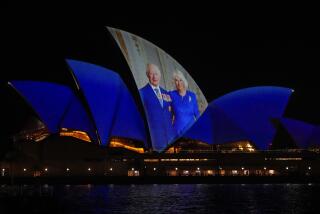Prospect of War Creates Rift Among Australians
- Share via
PERTH, Australia — PERTH, Australia -- The Australian public is deeply split over whether this country should join the United States if it decides to wage war against Iraq.
“I think we should go for it,” said Terry Dalling, 55, a civil engineer, as he strolled in Kings Park here among massive memorials to the Australians who have died in battle since the Boer War at the turn of the last century. “We should have gotten rid of him [Saddam Hussein] last time.”
But Karryn Mason, 23, a theater stage manager enjoying a picnic on a well-manicured lawn, said she opposes war with Iraq.
Australian Prime Minister John Howard “just wants to be seen as a world leader,” she said, “like President Bush and Tony Blair,” Britain’s prime minister. “He thinks a war will help him.”
Long a staunch U.S. ally, even at the height of the Vietnam War, many Australians are dubious about a strike on Iraq, particularly if it is mounted without United Nations approval.
A poll published this week by the Sydney-based John Fairfax publishing group found 30% of Australians oppose war with Iraq, 60% say Australia should get involved only as part of a U.N.-organized force, and 6% favor a war to topple Hussein. Known for paying close attention to surveys, Howard and his Labor Party ministers have said that Australia’s role will not be decided by a poll.
The prime minister has ordered several military units to the Persian Gulf, but he says he has not yet decided whether to authorize them to engage in combat.
At a private ceremony Friday in Perth for 300 special forces troops being sent to the Gulf, Defense Minister Robert M. Hill said the soldiers should help convince Hussein that “a line has been drawn in the sand and that he must disarm.”
The Special Air Service troops are known for their skill working behind enemy lines and for their reconnaissance abilities. Some of the troops served in Afghanistan.
Australian news accounts have suggested that the force will be larger than the one sent to support the U.S. strike against the Taliban regime in Afghanistan. Australian ships and planes are already patrolling the Persian Gulf and the Gulf of Oman as part of a multinational coalition to enforce sanctions on Iraq imposed after the 1991 Persian Gulf War.
Howard was heckled Thursday by protesters as the transport ship Kanimbla departed from Sydney Harbor. Howard said that if he decides to authorize offensive action, he will summon Parliament for debate but not to seek concurrence.
“You make a decision that you believe is in the best interests of Australia and the Australian people, and you cop the political consequence,” Hill said Friday.
The left-wing Green Party, calling the prime minister “dictatorial,” this week sought to force Howard to call the Senate into session on the issue. The move was defeated by Labor.
Some of the Australian antipathy has been aimed at U.S. ships in Perth. A small flotilla of protesters greeted the recent arrival of the aircraft carrier Abraham Lincoln, which has been ordered back to the Persian Gulf.
One protester in a small boat got within shouting distance of the carrier and demanded to see its “weapons of mass destruction.” Church-led protest groups have vowed to increase public demonstrations against Australian involvement in a war on Iraq.
At the Kanimbla farewell, opposition leader Simon Crean told troops: “I don’t want to mince words because I don’t think you should be going.... John Howard should listen to the Australian people, not George Bush.”
On Friday, Hill called Crean’s words “disappointing” and said they would unnecessarily increase the stress on the troops’ families. At Kings Park -- 1,000 acres overlooking the Swan River, with a panoramic view of the Perth skyline -- visitors were not surprised at the public’s deep divisions.
“A lot of people in Australia figure we’re so far away from the rest of the world that we can hunker down and the world’s problems won’t touch us,” said Dalling. “But we learned that’s not true at Bali” -- a reference to the October bombing of two nightclubs popular with Westerners on the Indonesian island. More than 190 people, many Australian, were killed.
Mason said she is worried that what she views as her country’s bid for international prestige will lead to more death.
“No one has explained to us how Iraq is a threat to Australia,” she said. “That’s what we haven’t heard yet.”
More to Read
Sign up for Essential California
The most important California stories and recommendations in your inbox every morning.
You may occasionally receive promotional content from the Los Angeles Times.











